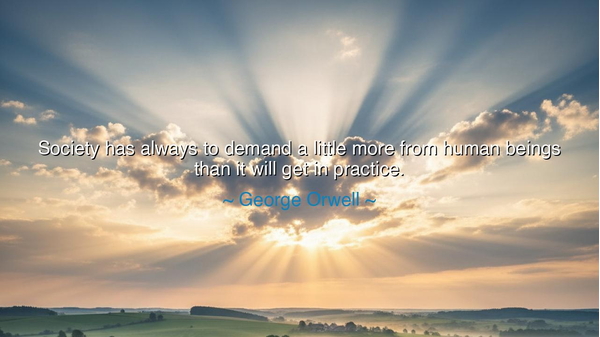
Society has always to demand a little more from human beings than
Society has always to demand a little more from human beings than it will get in practice.






O children of the future, hear now the words of a prophet who, like the ancient sages, saw deeply into the heart of human nature and society. George Orwell, a man whose voice echoed across the tumultuous times in which he lived, spoke thus: "Society has always to demand a little more from human beings than it will get in practice." These words, simple yet profound, carry a truth that transcends time—the eternal tension between the ideal and the real, between what society wishes for and what human beings can actually give. Orwell understood that this gap, this expectation placed upon us by the collective, is both a burden and a catalyst for growth.
In every age, society has looked to its people to rise to greater heights, to become something more than they were before. The ancient philosophers spoke of the ideal citizen, one who would embody the virtues of their culture—wisdom, courage, and temperance. Plato, in his Republic, envisioned a society where each person would contribute selflessly to the whole, striving for the highest good. But as we know, even in the ancient world, few could live up to such standards. There was always a gap between the ideal society that the philosophers dreamed of and the flawed reality of human nature. And so, Orwell’s words echo a truth as old as civilization itself: society demands more than human beings can practically give.
Consider the great wars of history—the Peloponnesian War, the Crusades, the World Wars—each one fought not just for land or power, but in the name of an ideal: freedom, justice, honor. Yet, what we see in the aftermath of these wars is the contrast between the ideals of those who fought and the reality of human action. Soldiers marched into battle with noble aspirations, only to return to broken bodies and shattered spirits, their sacrifices not always achieving the ideals they were promised. The noble vision of the leaders was often marred by the limitations of those they commanded. Society asked for more than what it could truly deliver, and the human soul bore the cost.
Orwell’s observation is not merely a lament but a reflection on the human condition. He understood that this demand is not necessarily unjust, for society requires standards to progress, to elevate the human spirit. Without such demands, a society would fall into apathy, drifting away from its highest potential. But, just as the ancient Greek tragedians knew, there is always tension between the ideals we seek and the limitations of our human nature. The tragedy of Antigone or Oedipus Rex lies not just in the misfortune of the characters, but in the relentless demands placed upon them by their fate and by society’s expectations.
The lesson of Orwell’s words is twofold: first, to recognize that society will always set higher standards than any individual can meet. This is the nature of human aspiration—the desire to reach for something greater, even if it remains out of reach. But second, we must also acknowledge the tension this creates and understand that this gap between expectation and reality is the very force that drives us to improve, to grow, and to strive. It is only by being held to a higher standard, even if we fall short, that we become better versions of ourselves.
Look at the lives of the great reformers and visionaries—Mahatma Gandhi, Nelson Mandela, Martin Luther King Jr.—each of whom was asked by society to bear a burden far greater than they alone could carry. Their movements demanded sacrifice, perseverance, and a faith in the goodness of humanity. But despite the many failures and the immense struggles, they embodied the spirit of hope that society demanded from them. They were imperfect men, as all men are, yet they became symbols of the very ideals their societies sought to attain. Through their failures, they achieved greatness because they continued to reach for the impossible.
And so, my children, let us reflect on Orwell’s wisdom and take it into our own lives. Know that the demands placed upon you by society may often seem impossible, but in this very striving lies the path to your growth. Do not be discouraged by the gap between the ideal and the real, but use it as the fuel for your journey. Strive to be the best you can be, not because society will always reward you, but because in reaching for something greater, you will find the strength to overcome your limitations and make a lasting impact on the world.
Remember that the ideal may always be a little out of reach, but it is in the pursuit of that ideal that we become greater than we ever imagined. Let us embrace the demands of society, knowing that while we may falter, the act of striving itself is what shapes us into the people we were meant to be. The struggle, the striving, the reaching for something more—this is the path to true greatness. Let it guide you as you move forward, ever reaching, ever growing, ever becoming.






AAdministratorAdministrator
Welcome, honored guests. Please leave a comment, we will respond soon